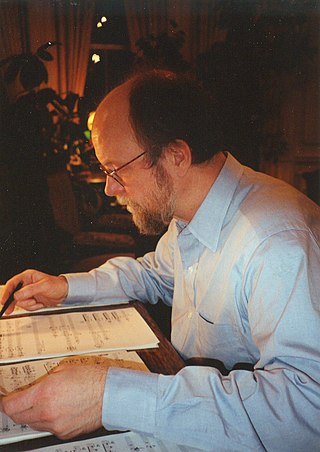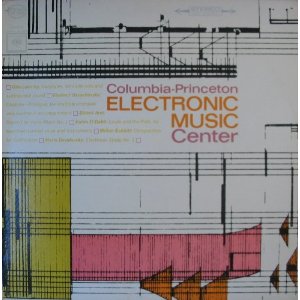The Group for Contemporary Music is an American chamber ensemble dedicated to the performance of contemporary classical music. It was founded in New York City in 1962 by Joel Krosnick, Harvey Sollberger and Charles Wuorinen and gave its first concert on October 22, 1962 [1] in Columbia University's MacMillin Theatre. Krosnik left the ensemble in 1963. It was the first contemporary music ensemble based at a university and run by composers. [2]
The Group was based at Columbia University from 1962 until 1971, when it took up residency at the Manhattan School of Music. [3] Initial support was provided by the Alice M. Ditson Fund of Columbia, followed later by support from a broad range of foundations and public sources. The Group's success led the Rockefeller Foundation to form lavishly-funded "spin-off" ensembles at Rutgers University, the University at Buffalo, the University of Iowa and the University of Chicago in the middle 1960s.
Early supporters of the Group included such Columbia faculty as Jack Beeson, Otto Luening and Vladimir Ussachevsky. Edgard Varese and Aaron Copland were also among its champions. The early years of the Group were tied in, as well, with the early development of electronic music in the United States. Early on the Group affiliated itself with the Columbia-Princeton Electronic Music Center, and many premieres of important new works involving instruments and electronics by such composers as Milton Babbitt, Mario Davidovsky and Vladimir Ussachevsky were presented on its concerts.
At the heart of the Group were its performers. Aside from Krosnik, Sollberger and Wuorinen, others who were central to its early and continued success included Sophie Sollberger, flute; Josef Marx, oboe; Arthur Bloom and Jack Kreiselman, clarinets; Donald MacCourt, bassoon; Barry Benjamin, horn; Ronald K. Anderson, trumpet; the brothers Robert and James Biddlecome, trombones; Raymond DesRoches and Richard Fitz, percussionists; Robert Miller, pianist; Aleck Karis, pianos; Susan Jolles, harp; Jeanne Benjamin, Benjamin Hudson and Linda Quan, violins; Jacob Glick and Lois Martin, violas; Fred Sherry and Peter Rosenfeld, cellos; Bertram Turetzky, Donald Palma and Kenneth Fricker, contrabasses; and Valarie Lamoreaux, soprano. Conducting duties were shared by Sollberger and Wuorinen and later with Gunther Schuller. Over the course of years, younger performers who had "learned the ropes" with the Group formed their own ensembles patterned on it; one outstanding example of this is Speculum Musicae, which was formed in 1971.
A broad range of composers was represented by the Group over the course of its first 25 years. A brief (but not exhaustive) list includes Tobias Picker, Edgard Varèse, Elliott Carter, Milton Babbitt, Igor Stravinsky, Béla Bartók, Donald Martino, Peter Westergaard, Benjamin Boretz, Otto Luening, Vladimir Ussachevsky, Mario Davidovsky, Goffredo Petrassi, Stefan Wolpe, Ursula Mamlok, Ralph Shapey, Karlheinz Stockhausen, Pierre Boulez, Luciano Berio, Harley Gaber, Alban Berg, Arnold Schoenberg, Anton Webern, Harrison Birtwistle, Peter Maxwell Davies, Ezra Laderman, Raoul Pleskow, Elaine Barkin, Arthur Berger, Yehudi Wyner, Bülent Arel, Joji Yuasa, Toru Takemitsu, Francisco Kropfl, Jeffrey Kresky, David Olan, Goffredo Petrassi, Aaron Copland, Morton Gould, Frederick Fox, Ross Lee Finney, Roger Reynolds, Robert Stewart, Jacob Druckman, Bernard Rands, Robert Hall Lewis, Claudio Spies, John Harbison, Joan Tower, Chester Biscardi, Carlos Salzedo, Lukas Foss, and Richard Edward Wilson.
The Group recorded extensively for a number of labels (CRI, RCA Victor, New World and later Koch and Naxos) and performed in venues such as the University of Chicago, the University of Iowa, Southern Illinois University, Amherst College, Swarthmore College, Princeton University, the Eastman School of Music, Washington and Lee University, Stony Brook University, Avery Fisher Hall (for the New York Philharmonic) and Rutgers University.
The ensemble was awarded a citation from the American Academy and Institute of Arts and Letters in 1985. [4]
{{cite web}}: CS1 maint: archived copy as title (link)
Milton Byron Babbitt was an American composer, music theorist, mathematician, and teacher. He was a Pulitzer Prize and MacArthur Fellowship recipient, recognized for his serial and electronic music.

Charles Peter Wuorinen was an American composer of contemporary classical music based in New York City. He also performed as a pianist and conductor. Wuorinen composed more than 270 works: orchestral music, chamber music, solo instrumental and vocal works, and operas, such as Brokeback Mountain. His work was termed serialist but he came to disparage that idea as meaningless. Time's Encomium, his only purely electronic piece, received the Pulitzer Prize. Wuorinen taught at several institutions, including Columbia University and the Manhattan School of Music.
The Computer Music Center (CMC) at Columbia University is the oldest center for electronic and computer music research in the United States. It was founded in the 1950s as the Columbia-Princeton Electronic Music Center.
Alfred Whitford (Fred) Lerdahl is the Fritz Reiner Professor Emeritus of Musical Composition at Columbia University, and a composer and music theorist best known for his work on musical grammar and cognition, rhythmic theory, pitch space, and cognitive constraints on compositional systems. He has written many orchestral and chamber works, three of which were finalists for the Pulitzer Prize for Music: Time after Time in 2001, String Quartet No. 3 in 2010, and Arches in 2011.
Otto Clarence Luening was a German-American composer and conductor, and an early pioneer of tape music and electronic music.
Mario Davidovsky was an Argentine-American composer. Born in Argentina, he emigrated in 1960 to the United States, where he lived for the remainder of his life. He is best known for his series of compositions called Synchronisms, which in live performance incorporate both acoustic instruments and electroacoustic sounds played from a tape.
The New York New Music Ensemble (NYNME) is an American contemporary music ensemble. Since 1976, the group has commissioned, performed and recorded works by both emerging and prominent living composers. Its performances have been featured at several major music festivals including the Ravinia Festival, the Santa Fe Chamber Music Festival, June in Buffalo, the Pacific Rim Music Festival, and the Thailand International Composition Festival (TICF). NYNME has also been recognized and supported by many significant American foundations, including the Jerome Foundation, the Fromm Foundation at Harvard, the Mary Flagler Cary Foundation, the Mellon Foundation, the Koussevitzky Foundation, and the NEA and NYSCA. The group has held numerous residencies at universities, such as Rice University, Emory University, Brandeis University, the University of Wisconsin–Madison, the University of Pittsburgh, and Princeton's Institute for Advanced Study. Over the years, NYNME has premiered over 140 works, the vast majority of which were written specifically for the group. Among the prominent composers with whom the group has enjoyed longstanding associations are Elliott Carter, Jacob Druckman, Charles Wuorinen, Mario Davidovsky, Harvey Sollberger, Joan Tower, George Perle, Rand Steiger, John Eaton, and David Felder. The group's activities have also included tours in Europe, Asia, and South America.
Vladimir Alexeevich Ussachevsky was a composer, particularly known for his work in electronic music.
Joel Krosnick is an American cellist who has performed as a soloist, recitalist, and chamber musician throughout the world for over 40 years. As a member of the Juilliard String Quartet from 1974 to 2016, he performed the great quartet literature throughout North America, Europe, Asia, and Australia.
Composers Recordings, Inc. (CRI) was an American record label dedicated to the recording of contemporary classical music by American composers. It was founded in 1954 by Otto Luening, Douglas Moore, and Oliver Daniel, and based in New York City.
Harvey Sollberger is an American composer, flutist, and conductor specializing in contemporary classical music.
Jeffrey Milarsky is a conductor of contemporary music in New York City.

Columbia-Princeton Electronic Music Center was an album of electronic music released in 1964. It was the recording of a concert performed at the McMillin Theater at Columbia University on May 9 and 10, 1961. The stereo version was MS 6566 and the monophonic version was ML 5966. There was a sequel released in 1998 on the New World label titled Columbia-Princeton Electronic Music Center 1961–1973. Bülent Arel is the only artist who appears on both albums.
Peter Jarvis is an American percussionist, drummer, conductor, composer, music copyist, print music editor and college professor.
Pril Smiley is an American composer and pioneer of electronic music.
Roger John Goeb was an American composer.
Robert Miller was an American pianist and attorney.
Matthew Jonathan Greenbaum is an American musician, composer and author.
The Chamber Music Conference and Composers' Forum of the East (CMC) is a summer conference that brings together amateur musicians, professional faculty, and composers-in-residence to study and play chamber music. The CMC was founded in 1946, and most of its summer sessions have been held at Bennington College in Bennington, Vermont. After the 2019 session, the CMC announced its relocation to the campus of Colgate University in Hamilton, New York, to begin with its 75th anniversary session in 2022. There was a limited 2021 program at Bennington College.